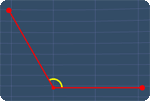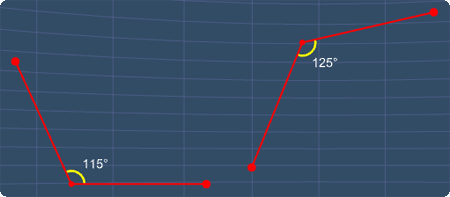Obtuse Angles
Lesson Objective
In this lesson, we will learn about obtuse angles.
About This Lesson
After knowing what are acute angle and right angle, we will now learn:
- What are obtuse angles.
- See some examples on identifying them.
The study tips below will give you a short summary on this.
The math video below will explain in depth about this. Furthermore, it will show some examples so that you can understand this lesson better.

Study Tips
Tip #1
If an angle is more than 90° and less than 180°, it is called an obtuse angle. Below are some examples:

The math video below will explain more on this.
Math Video
Lesson Video
Sponsored Links
Math Video Transcript
00:00:03.120
In this lesson, we will learn about obtuse angles.
00:00:07.230
Let's take a look at this angle.
00:00:11.110
Now, when an angle is somewhere between 90 degrees and 180 degrees, it is called obt. angle.
00:00:22.220
In other words, an obt. angle is always more than 90 degrees, and less than 180 degrees.
00:00:31.180
Let's see some examples on this.
00:00:35.130
Consider this angle of 150 degrees. Is this an obt. angle?
00:00:43.050
Yes! It is.
00:00:47.020
Next example, take a close look at this angle. Is this an obt. angle?
00:00:56.000
We know that, an obt. angle is always more than 90 degrees. This is true, for this angle.
00:01:05.050
Also, it is always lesser than 180 degrees. This is also true, for this angle.
00:01:13.230
So, it is clear that, this is an obt. angle.
00:01:19.120
Next, how about this angle?
00:01:23.130
Clearly, this angle is less than 90 degrees.
00:01:28.010
Hence, it is not an obt. angle.
00:01:33.000
How about this angle?
00:01:36.070
Now, this angle is more than 180 degrees.
00:01:40.240
Hence, this is not an obt. angle.
00:01:45.220
That is all for this lesson.
Practice Questions & More
Multiple Choice Questions (MCQ)
Now, let's try some MCQ questions to understand this lesson better.
You can start by going through the series of questions on obtuse angles or pick your choice of question below.
- Question 1 on identifying this type of angle.
Site-Search and Q&A Library
Please feel free to visit the Q&A Library. You can read the Q&As listed in any of the available categories such as Algebra, Graphs, Exponents and more. Also, you can submit math question, share or give comments there.


